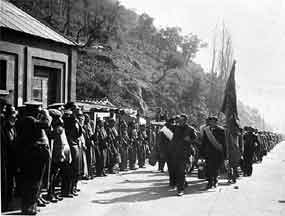Robert Jordan aims to destroy a bridge nested in the hills of Spain. He's fighting fascists in the Spanish Civil War, and for this mission he has embedded himself within a group of cave squatting peasants who casually identify as Communist Republican guerrillas. Jordan's new local comrades are a motley bunch that includes a modestly perfect old man, a couple gypsies, a once-ruthless but now shelled guerrilla hero, their hard boiled matron, and a victimized young beauty Robert takes for a lover. All of them are on his mission now, and to varying degrees each of them knows it will bring death.
Hemingway's protagonist fights the fascists but much of the action in
For Whom the Bell Tolls unfolds in Robert's thoughts. It is there a quiet battle burns between cynicism and idealism, drafting in its duration his politics, his humanity, values, lineage, and his identity. The conclusion is appropriately unresolved, situated somewhere between an existentialist's consignment and a young boy's pretending.
Hemingway's pacing can put the reader to work, but this work brings satisfaction when it's done.
 Midway through Ernest Hemingway's The Sun Also Rises, two young guerrillas named Andres and Primitivo probe American expat Robert Jordan about politics and wealth in the US. Andres asks, "Do you have any big proprietors?" Then, "But there are not great estates that must be broken up?" The narrative goes on with Jordan answering,
Midway through Ernest Hemingway's The Sun Also Rises, two young guerrillas named Andres and Primitivo probe American expat Robert Jordan about politics and wealth in the US. Andres asks, "Do you have any big proprietors?" Then, "But there are not great estates that must be broken up?" The narrative goes on with Jordan answering,